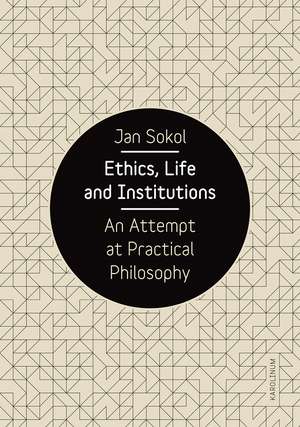Ethics, Life and Institutions: An Attempt at Practical Philosophy
Autor Jan Sokol Traducere de Neil Cairns, Markéta Pauzerováen Limba Engleză Paperback – 20 apr 2017
General complaints about moral decay, however frequent and even justified they may be, are of little use. This book does not complain; it acts. Jan Sokol’s Ethics, Life and Institutions applies our ever improving knowledge in various fields to questions of morality in an effort to enhance our ability to discern different moral phenomena and to discuss them more precisely.
With few exceptions, moral philosophy considers the acting person to be an autonomous, independent individual pursuing his or her own happiness. But in the context of social institutions—for example, in workplaces—it is often an organization’s goals, not an individual’s, that take precedence. In complex networks of organizations, morals take a different shape. Divided into three parts, this book begins by exploring basic notions such as freedom, life, responsibility, and justice, and their relationship to practical philosophy; looks to the main schools of Western thought in the search for a common moral foundation; and reintroduces the forgotten idea of biological and cultural heritage—an idea that could prove fundamental in addressing our responsibility not only to human lives, but also to the natural world. In a closing analysis, Sokol brings all of these moral concepts to bear on problems connected to the growing complexity of institutions, offering hope for a practical philosophy for the modern world.
With few exceptions, moral philosophy considers the acting person to be an autonomous, independent individual pursuing his or her own happiness. But in the context of social institutions—for example, in workplaces—it is often an organization’s goals, not an individual’s, that take precedence. In complex networks of organizations, morals take a different shape. Divided into three parts, this book begins by exploring basic notions such as freedom, life, responsibility, and justice, and their relationship to practical philosophy; looks to the main schools of Western thought in the search for a common moral foundation; and reintroduces the forgotten idea of biological and cultural heritage—an idea that could prove fundamental in addressing our responsibility not only to human lives, but also to the natural world. In a closing analysis, Sokol brings all of these moral concepts to bear on problems connected to the growing complexity of institutions, offering hope for a practical philosophy for the modern world.
Preț: 98.63 lei
Preț vechi: 116.62 lei
-15% Nou
Puncte Express: 148
Preț estimativ în valută:
18.87€ • 19.75$ • 15.71£
18.87€ • 19.75$ • 15.71£
Carte indisponibilă temporar
Doresc să fiu notificat când acest titlu va fi disponibil:
Se trimite...
Preluare comenzi: 021 569.72.76
Specificații
ISBN-13: 9788024634296
ISBN-10: 8024634295
Pagini: 230
Dimensiuni: 146 x 203 x 15 mm
Greutate: 0.34 kg
Editura: Karolinum Press, Charles University
Colecția Karolinum Press, Charles University
ISBN-10: 8024634295
Pagini: 230
Dimensiuni: 146 x 203 x 15 mm
Greutate: 0.34 kg
Editura: Karolinum Press, Charles University
Colecția Karolinum Press, Charles University
Notă biografică
A former dissident, translator, and post-1990 Czech politician, Jan Sokol teaches courses in phenomenology, philosophic anthropology, religious science, and anthropology of law at Charles University Prague. He is the author of Thinking about Ordinary Things: A Short Invitation to Philosophy, also published by Karolinum Press. Neil Cairns and Markéta Pauzerová work jointly on translations from Czech into English and are based in Scotland.
